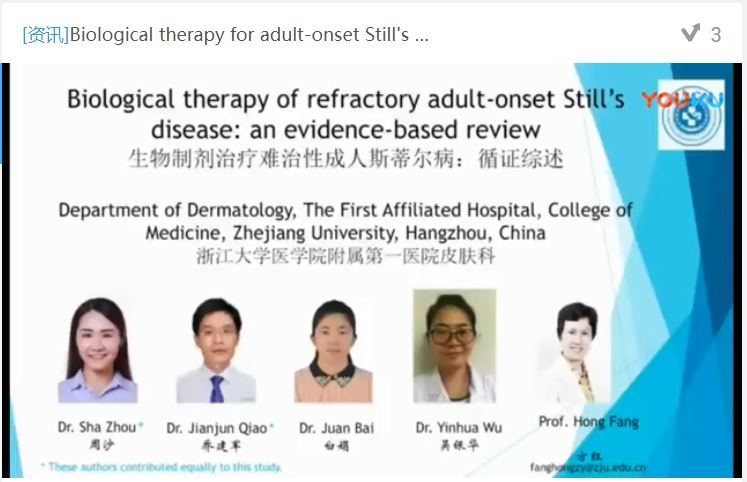9 0 5 7 8
论文已发表
注册即可获取德孚的最新动态
IF 收录期刊
- 2.6 Breast Cancer (Dove Med Press)
- 3.9 Clin Epidemiol
- 3.3 Cancer Manag Res
- 3.9 Infect Drug Resist
- 3.6 Clin Interv Aging
- 4.8 Drug Des Dev Ther
- 2.8 Int J Chronic Obstr
- 8.0 Int J Nanomed
- 2.3 Int J Women's Health
- 3.2 Neuropsych Dis Treat
- 4.0 OncoTargets Ther
- 2.2 Patient Prefer Adher
- 2.8 Ther Clin Risk Manag
- 2.7 J Pain Res
- 3.3 Diabet Metab Synd Ob
- 4.3 Psychol Res Behav Ma
- 3.4 Nat Sci Sleep
- 1.9 Pharmgenomics Pers Med
- 3.5 Risk Manag Healthc Policy
- 4.5 J Inflamm Res
- 2.3 Int J Gen Med
- 4.1 J Hepatocell Carcinoma
- 3.2 J Asthma Allergy
- 2.3 Clin Cosmet Investig Dermatol
- 3.3 J Multidiscip Healthc

Biological therapy of traditional therapy-resistant adult-onset Still’s disease: an evidence-based review
Authors Zhou S, Qiao J, Bai J, Wu Y, Fang H
Received 29 October 2017
Accepted for publication 6 December 2017
Published 24 January 2018 Volume 2018:14 Pages 167—171
DOI https://doi.org/10.2147/TCRM.S155488
Checked for plagiarism Yes
Review by Single-blind
Peer reviewers approved by Dr Hoa Le
Peer reviewer comments 2
Editor who approved publication: Professor Deyun Wang
Background: Biotherapy is becoming increasingly important in the treatment of
adult-onset Still’s disease (AOSD). The aim of our study was to evaluate the
efficacy and safety of biological therapy for AOSD resistant to traditional
therapy.
Patients and methods: Database of Library of Congress, the PubMed, and
Web of Science Core Collection were used to retrieve relevant articles
published in English language until March 2017. Only studies published in
English language were included, and the additional references quoted in these
articles were also checked. Articles concerning the efficacy and safety of all
the biotherapies in refractory AOSD were evaluated.
Results: There were 112 articles available in total; 422 AOSD
patients were given at least one biologic. We found that 293 patients (69.43%)
had received TNF-α blocking agents (infiliximab, etanercept, and adalimumab),
194 patients (45.97%) were treated with IL-1 receptor antagonists (anakinra,
rilonacept, and canakinumab), 163 patients (38.63%) were given IL-6 inhibitor
(tocilizumab), and 24 patients (5.69%) received rituximab and abatacept. The
efficacy of biological therapy and overall tolerance of biological therapy for
refractory AOSD were good. Thirty two of 271 patients given anti-TNF-α
therapies (11.81%), 116 patients receiving IL-1 inhibitors (65.54%), 124
patients receiving tocilizumab (76.07%), and 13 patients given other biological
therapies (36.11%) achieved remission. Side effects of biologic therapy were
infections such as urinary tract infections and soft tissue abscess.
Conclusion: Our findings suggest that anakinra and tocilizumab may
be good choices for the treatment of refractory AOSD considering the
effectiveness and safety.
Keywords: adult-onset
Still’s disease, biological therapy, treatment, side effects, anakinra,
toclizumab
摘要视频链接:Biological therapy for adult-onset
Still’s disease
